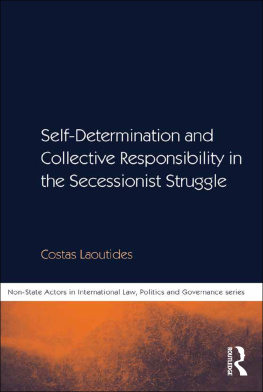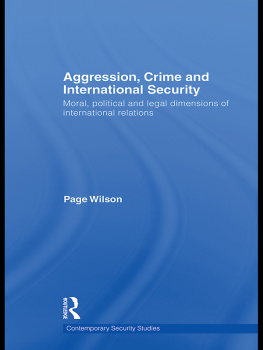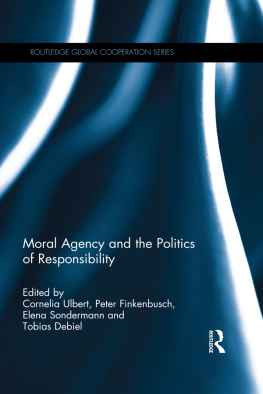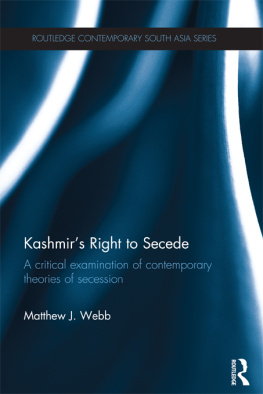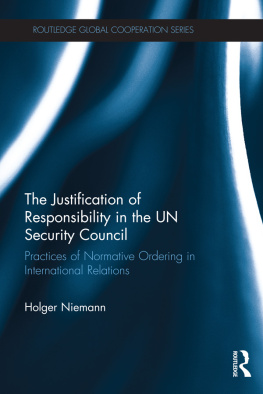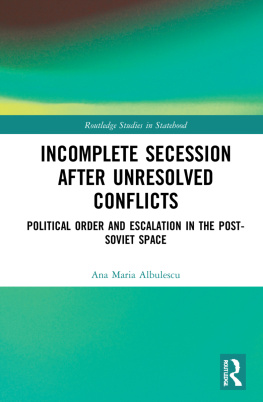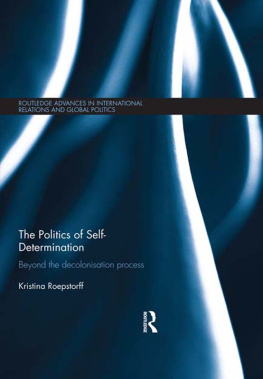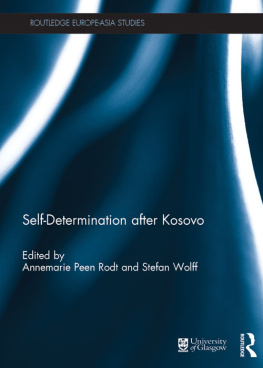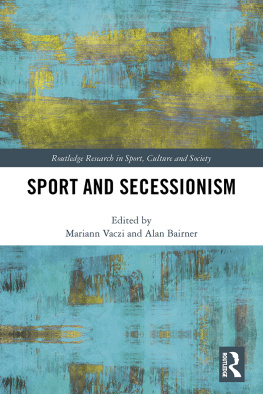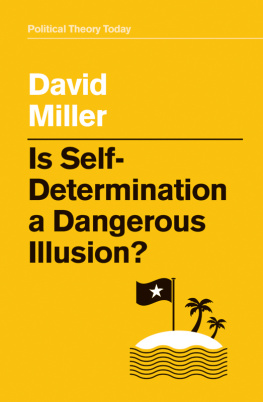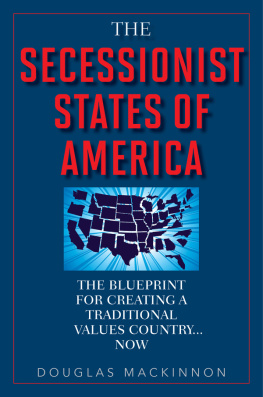SELF-DETERMINATION AND COLLECTIVE RESPONSIBILITY IN THE SECESSIONIST STRUGGLE
Non-State Actors in International Law, Politics and Governance Series
Series Editor
Professor Math Noortmann, Oxford Brookes University, UK
The proliferation of non-state actors in the international system over the last three decades has increased the need for a broader theoretical analysis and empirical validation. The series explores the capabilities and impact of non-state actors, such as privately-based transnational corporations, non-governmental organizations (NGOs), international criminal organizations, and liberation movements, as well as intergovernmental organizations (in which NGOs often participate). The series seeks to address this need and to deepen the knowledge and understanding of non-state actors by scholars, practitioners and students in the fields of international law, politics and governance. By emphasizing legal, political and governance aspects of non-state actors activities at the international (global or regional) level, the series intends to transcend traditional disciplinary and organizational boundaries.
Also in the series
Transforming Law and Institution
Indigenous Peoples, the United Nations and Human Rights
Rhiannon Morgan
ISBN 978 0 7546 7445 0
Non-State Actor Dynamics in International Law
From Law-Takers to Law-Makers
Edited by Math Noortmann and Cedric Ryngaert
ISBN 978 1 4094 0316 6
Making Corporate Social Responsibility a Global Concern
Norm Construction in a Globalizing World
Lisbeth Segerlund
ISBN 978 0 7546 7707 9
Partners in Peace
Discourses and Practices of Civil-Society Peacebuilding
Mathijs van Leeuwen
ISBN 978 0 7546 7743 7
Self-Determination and Collective Responsibility in the Secessionist Struggle
COSTAS LAOUTIDES
Deakin University, Australia
First published 2015 by Ashgate Publishing
Published 2016 by Routledge
2 Park Square, Milton Park, Abingdon, Oxon OX14 4RN
711 Third Avenue, New York, NY 10017, USA
Routledge is an imprint of the Taylor & Francis Group, an informa business
Copyright Costas Laoutides 2015
Costas Laoutides has asserted his right under the Copyright, Designs and Patents Act, 1988, to be identified as the author of this work.
All rights reserved. No part of this book may be reprinted or reproduced or utilised in any form or by any electronic, mechanical, or other means, now known or hereafter invented, including photocopying and recording, or in any information storage or retrieval system, without permission in writing from the publishers.
Notice:
Product or corporate names may be trademarks or registered trademarks, and are used only for identification and explanation without intent to infringe.
British Library Cataloguing in Publication Data
A catalogue record for this book is available from the British Library
The Library of Congress Cataloging-in-Publication Data has been applied for
ISBN: 9781472433121 (hbk)
ISBN: 9781315608297 (ebk-PDF)
ISBN: 9781317057451 (ebk-ePUB)
To Evi and Regas
Contents
Acknowledgments
At the end of a long and often demanding course of study, I am pleased to thank a number of people who contributed significantly to the completion of this volume.
I am deeply grateful to Professor Toni Erskine and Professor Andrew Linklater, for allowing me to try my ideas on them. They embraced my project with sensitivity and offered their advice unreservedly. I would also like to thank Professor David Miller for giving me the opportunity to work with him and exchange ideas when I spent a term at the Department of Politics and International Relations, University of Oxford.
Undoubtedly Professors Mervyn Frost, John Groom, Keith Webb and Andrew Williams played a very important role in shaping my thought by introducing me to the fields of ethics in International Relations Theory and International Conflict Analysis.
However, I would never get that far without the guidance of Professor Alexis Heraclides. As my tutor, Alexis initiated me in the study of secession. For his inspiration and support to pursue my dreams I am most indebted.
I am grateful to Professor Alexandar Pavkovi for his useful comments and observations during our discussions. Dr Cian ODriscoll and Dr Iraklis Oikonomou besides being dear friends proved to be generous and challenging dialogiciansI am grateful for their friendship and support.
I owe a special mention, here, to Professor Rosemary Wright and, especially, to the late Professor Moorehead (Pete) Wright for being such great friends and supporters of my aspirations.
This work would have not started, let alone completed, without the support of my wife Evi and my son Regas. Not only they have been a continuous source of confidence, but they were always ready to make the extra mile unconditionally, even in the darkest of times. I dedicate this work to them and to the forthcoming and exciting changes in our life.
Introduction
Secession in International Politics
Secession is not a new phenomenon in international politics. It came to the foreground two decades ago when the thunderous break-up of Yugoslavia and the Soviet Union challenged the very foundations of world order by questioning its inner core norm of the territorial integrity of the state. Currently, secessionist claims all over the globe remain a regrettable source of the conflict and violence which affects millions of people and threatens political and economic stability in particularly sensitive geopolitical spots. Very recent examples of the perils of secessionist violence have been seen in the carnage of the Tamils in Sri Lanka, the Kurdish engagement in the Syrian civil war, and the creation of South Sudan as a response to a long and bloody separatist war. Furthermore, despite the considerable airing that secession received in the past little progress has been made towards a global political agenda for separatist conflict resolution. The fragmented and ad hoc way in which the international community has dealt with separatist conflict is summed up in the prevailing view that secession is simply anathema for the international order as opposed to centralization (Livingston 1998, p. 38). Yet, given the dangerous dynamic and frequency of secessionist claims worldwide, a thoroughly constructed response to the phenomenon is imperative.
Secession is a socio-political phenomenon and a corollary to the way in which the international system was gradually formed over the past three centuries. It is the result of a long historical, intellectual, and political process that took place initially in Europe leading to the evolution of the territorial nation-state as the perceived basic unit of political organization in international relations. Territorial control is a sine qua non condition for the existence of a state and its political community and thus it is associated with survival in international politics (Buzan 1991, pp. 6592; Kratochwil, Rohrlich and Mahajan 1985, p. 3; Toft 2006, pp. 1733). Secession is wedded to the principle of self-determination which theoretically draws on the nationalist conviction that societies could be broken down to natural political units, loosely given the title of nations, an idea initially implemented in the early nineteenth century (Bowker 2004, p. 461; Devotta 2005, p. 141; Mayall 1990; Mayall and Simpson 1992, pp. 1214; Petrie 1946, pp. 15373). The core argument that sealed the character of the principle was that, based on national ties, social frictions would be minimized and societies could realize their full potential.

